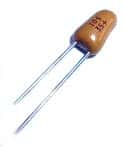Tantalite, which is the key component of tantalum used to make tantalum capacitors, is mined primarily in three countries: Australia, Mozambique and Canada. Companies in those countries reduced or suspended production as the economy tanked in 2008 and consumer spending fell.
Recently, most production of tantalum has been taking place in Brazil and Africa but with the previous production facilities not producing the tantalum, a shortage through 2012 is possible.
What does that mean to consumers and companies that need tantalum capacitors?
Increased demand will push prices higher on current stock….and if current supplies are depleted, a shortage like the one that occurred in 2000 may occur pushing up prices even further.
Tantalum capacitors have grown in popularity for many reasons. To start with, tantalum capacitors have a larger volumetric efficiency when compared to other types of capacitors. To illustrate this point, a 10uF tantalum can be used in place of a 100uF aluminum capacitor.
In addition, tantalum capacitors are able to be inserted on circuit boards easily. When you couple this with the tantalum capacitor’s greater power dissipation characteristics when looking at other capacitors in this size range, tantalum capacitors can be inserted in small spaces. This makes them good candidates for tightly designed boards. You will often find tantalum capacitors used in laptops, computers, cellular phones, auto circuits and other similarly sized electronic devices.
Another outstanding characteristic of tantalum capacitors is their nearly unrivaled life span. The shelf life of tantalum capacitors is unparalleled when looking at other capacitor types such as those made from electrolytic material since the performance qualities stay intact over time and they should not lose capacitance like many other popular capacitors.

